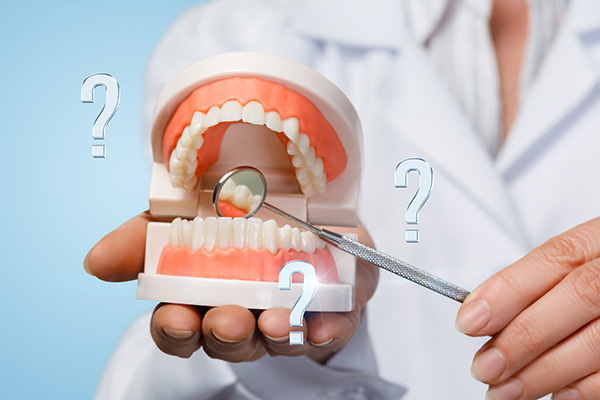Options for Replacing Missing Teeth: Weighing the Pros and Cons of Dentures
 Dentures are a well-known option for replacing missing teeth that are often given a bad reputation in their reliability. We have all watched the childhood film, where the elderly character has their dentures fall out of their mouth at the dinner table. While this exaggerated age-old misconception is based on legitimate concerns of denture wearing, many people have found long-term success with denture use.
Dentures are a well-known option for replacing missing teeth that are often given a bad reputation in their reliability. We have all watched the childhood film, where the elderly character has their dentures fall out of their mouth at the dinner table. While this exaggerated age-old misconception is based on legitimate concerns of denture wearing, many people have found long-term success with denture use.
Dentures are removable dental appliances made to replace a series of, or individual, missing teeth. They can be constructed as full dentures to replace an entire jawline of teeth or as partial dentures to replace a smaller series of missing teeth; based on the need of the wearer. When deciding whether dentures are the option for replacing missing teeth that are right for you, there are pros and cons that should be taken into consideration:
Pros of wearing dentures:
- While they can vary in the number of teeth included, from a full set of teeth to a partial set, or even an individual tooth, all can help provide you with a fully functional set of teeth.
- Custom-fit and designed to provide comfort and a natural-looking and aesthetically pleasing set of teeth.
- Promote more normal function when speaking and chewing.
- Partial dentures can help prevent the shifting of remaining natural teeth due to open space along the jawline from missing teeth.
- Can help decrease the rate of bone loss from missing teeth, helping maintain jaw strength and natural facial structure.
- Removable for proper cleaning of both the dental appliance and the area of the mouth where it is placed.
- Low-cost option for replacing multiple missing teeth.
Cons of wearing dentures:
- While designed to look similar to natural teeth, dentures do not look as natural or match remaining natural teeth as well as other options for replacing missing teeth.
- Full sets must be properly secured with adhesive, or slipping may occur. Even with proper adhesive, slippage may occur on occasion, causing difficulty with eating and speaking.
- Partial dentures often require grooves to be carved into remaining natural teeth to help provide stability to the device.
- Bacteria and food may become trapped between the appliance and the gums during use, increasing the risk of gum disease.
- Certain foods cannot be eaten with dentures, including sticky foods or foods that require forceful biting and chewing, such as caramel or corn on the cob.
- Proper cleaning requires multiple steps, including soaking in a special solution throughout the night- meaning the appliance cannot be used 24 hours a day.
- Partial dentures may cause damage to adjacent teeth.
- Require frequent replacement, lasting less than ten years on average.
Dentures are an option for replacing missing teeth that have many pros and cons that should be considered and discussed with a dental professional when deciding which replacement option is right for you. With proper use and hygiene, many people have found great success with long-term denture usage and find them to be a very effective replacement option for them.
Recent Posts
Traditional bridges are a common option for replacing missing teeth. There are many natural as well as unnatural reasons why a person might have lost his teeth. Whatever the reason is, dentists intend to replace the missing teeth with the best procedure. Traditional bridges are one of them.If you have missing teeth, dental bridges can…
Do you have a missing tooth? There are various options for restoring a single missing tooth instead of several missing teeth. Read on to learn about your options. You can make the best selection for your situation if you know all the available options for replacing a lost tooth.Although leaving the lost tooth unreplaced is…
Are you looking into your options for replacing missing teeth? Fortunately, there are various options for replacing missing teeth. This article covers these options, including their benefits and drawbacks. Replacing missing teeth after a tooth extraction is important for bone health since tooth loss results in a loss of bone density. Also, failing to get…


